 Petzlover
Petzlover Bull Terrier Miniature is originated from United Kingdom but Sakhalin Husky is originated from Japan. Bull Terrier Miniature may grow 33 cm / 12 inches shorter than Sakhalin Husky. Bull Terrier Miniature may weigh 25 kg / 55 pounds lesser than Sakhalin Husky. Both Bull Terrier Miniature and Sakhalin Husky has same life span. Both Bull Terrier Miniature and Sakhalin Husky has almost same litter size. Bull Terrier Miniature requires Low Maintenance. But Sakhalin Husky requires Moderate Maintenance
Bull Terrier Miniature is originated from United Kingdom but Sakhalin Husky is originated from Japan. Bull Terrier Miniature may grow 33 cm / 12 inches shorter than Sakhalin Husky. Bull Terrier Miniature may weigh 25 kg / 55 pounds lesser than Sakhalin Husky. Both Bull Terrier Miniature and Sakhalin Husky has same life span. Both Bull Terrier Miniature and Sakhalin Husky has almost same litter size. Bull Terrier Miniature requires Low Maintenance. But Sakhalin Husky requires Moderate Maintenance
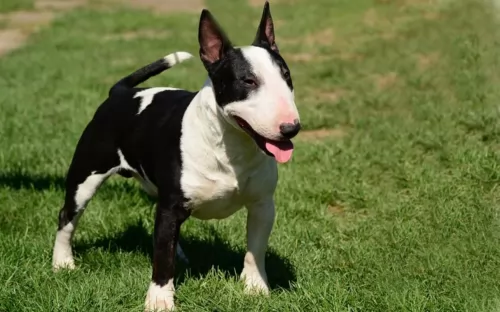 Less well known than the Bull Terrier, the Miniature Bull Terrier which actually follows the same breed standard, has a height of 35cm. The Bull Terrier and Miniature are classified as the same breed. The weight of the smaller Miniature is only about 15kg.
Less well known than the Bull Terrier, the Miniature Bull Terrier which actually follows the same breed standard, has a height of 35cm. The Bull Terrier and Miniature are classified as the same breed. The weight of the smaller Miniature is only about 15kg.
It was in the early 1800s that the Miniature Bull Terrier was developed, descending from the English Bulldog as well as the White English Terrier which is now extinct. This blend produced the Bull and Terrier, which was later shortened to the Bull Terrier. They came in a number of colors such as pure white, white and tan as well as white-and-black-patched or tri-colored.
Breed fanciers wanted a compact dog which looked much the same as the larger Bull Terrier. It was in 1938 that Colonel Glyn founded the Miniature Bull Terrier Club in England and the Miniature Bull Terrier Club of America was formed in 1966.
 Known also as the Karafuto-Ken, the Sakhalin Husky is a dog that has been used as a sled dog, but which is now almost extinct.
Known also as the Karafuto-Ken, the Sakhalin Husky is a dog that has been used as a sled dog, but which is now almost extinct.
Hailing from Japan, it is believed that in 2011, there were only two surviving members of the breed in Japan. There isn’t much history on these dogs, but we do know that it is an old breed. They've been used by explorers to the South Pole. One such explorer was Robert Falcon Scott.
They’re extremely tough dogs, known for enduring in the snow under extreme conditions. The dog breed isn’t recognized as a standardized breed by any of the major kennel clubs.
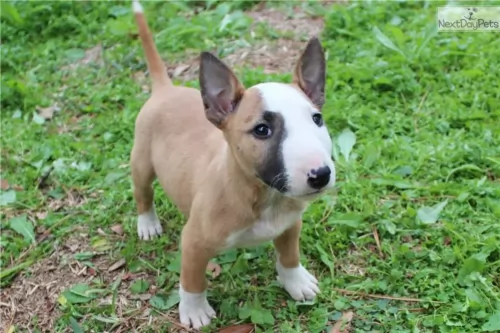 Miniature Bull Terriers, just like the regular Bull Terriers have short, glossy coats and these coats can be white, tan, brindle or tri-color such as black, tan and white. This is a muscular little dog, with the same very distinctive egg-shaped head and small, closely-set dark eyes and erect ears. The medium length tail is carried horizontally.
Miniature Bull Terriers, just like the regular Bull Terriers have short, glossy coats and these coats can be white, tan, brindle or tri-color such as black, tan and white. This is a muscular little dog, with the same very distinctive egg-shaped head and small, closely-set dark eyes and erect ears. The medium length tail is carried horizontally.
The Miniature Bull Terrier isn’t particularly good with small children, but he still makes a good companion for people, whether he lives in the city or the country. In fact, this smaller breed Bull Terrier makes a great pet for people with smaller spaces, and like the Bull Terrier, he is a loving, devoted pet. He has an entertaining personality, is playful and energetic, making him a good watch dog.
However, even though he is small, he is always more than ready to take on any larger pets and therefore isn’t considered the greatest pet to have if you have other animals in the house. However, with excellent training and socialization, this handicap can be overcome.
 This is a medium sized dog standing at between 56 and 66cm in height and weighing between 30 and 40kg. His coat is thick and can be in a number of colours such as brown, tan, cream, grey or black. The ears are small and pointed and slightly tilted forwards. The tail is long and sometimes curls over the back while at other times it is held straight or down.
This is a medium sized dog standing at between 56 and 66cm in height and weighing between 30 and 40kg. His coat is thick and can be in a number of colours such as brown, tan, cream, grey or black. The ears are small and pointed and slightly tilted forwards. The tail is long and sometimes curls over the back while at other times it is held straight or down.
These dogs are known for their loyalty, affection and bravery. The dog is highly intelligent and will respond well to training and socialization.
It's a rare dog breed, calm and confident. A perfect example of their amazing characteristics is seen in the film ‘Eight Below’ where these wonderful dogs were left behind on a scientific expedition that went wrong.
The dogs had to struggle for survival in the frozen wilderness. The Sakhalin Husky just wants to please, and is alert and intelligent, doing well in a family where there are children.
Statues have been erected to honor these Sakhalin Huskies who died on some of these ill-fated expeditions.
These dogs are totally devoted to their owners and they’re full of confidence, they’ve got immense strength and they need a lot of physical stimulation every day.
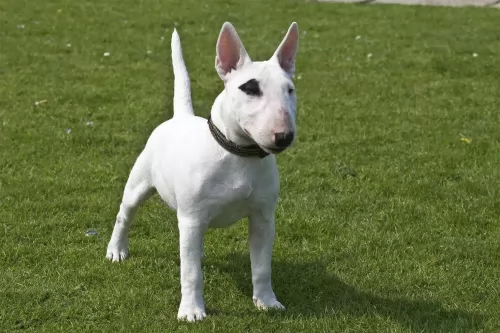 The attractive Miniature Bull Terrier is just a small version of the regular Bull Terrier, and many people are drawn to them because they have all the spunk of the larger breed but are easier to manage. He is such an entertaining little dog and guarantees to make an excellent family companion. He is just longing to be involved in every family activity happening around him.
The attractive Miniature Bull Terrier is just a small version of the regular Bull Terrier, and many people are drawn to them because they have all the spunk of the larger breed but are easier to manage. He is such an entertaining little dog and guarantees to make an excellent family companion. He is just longing to be involved in every family activity happening around him.
He becomes attached to his human family, but this deep bond between him and his family can lead to separation anxiety. Never leave him alone day after day in the backyard. You wouldn’t to that to one of your children, and he is a family member, albeit a 4-legged one.
Just like the standard Bull Terrier, the Miniature Bull Terrier is going to need firm training from a young age. Then he becomes an exceptional pet as he understand the boundaries in your particular home.
 When you bring these dogs into your home, you’re bringing in lots of excellent characteristics.
When you bring these dogs into your home, you’re bringing in lots of excellent characteristics.
He is loyal, affectionate and smart. With his above average intelligence, you can easily train him. He is also a playful breed and the kids will enjoy him as a good playmate.
They’re gentle dogs too and will do well in a home where people are fair, patient, kind and consistent with their handling of him. Known to be an excellent therapy dog, having this dog in your home will enhance your quality of life.
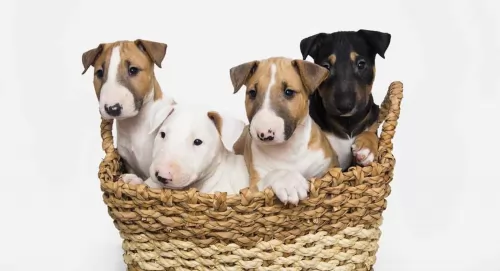 The Miniature Bull Terrier can live to be 10 to 12 years of age. Their most serious health issue is blindness which is caused by lens dislocation, showing up more or less after 3 years of age. With the white dogs, other breed health concerns can include congenital deafness and compulsive tail chasing.
The Miniature Bull Terrier can live to be 10 to 12 years of age. Their most serious health issue is blindness which is caused by lens dislocation, showing up more or less after 3 years of age. With the white dogs, other breed health concerns can include congenital deafness and compulsive tail chasing.
Some Bull Terriers develop a compulsive neurologic disorder where the dog turns round and round chasing his tail. As soon as you see this, try and distract him with an exciting game, because allowed to develop, it’s a habit that can become difficult to control.
This is a common problem with dogs and you need to watch that tartar build-up on the teeth which can lead to infection of the gums. Brush your pet’s teeth with special dog toothpaste and toothbrush 2 or 3 times a week so that he doesn’t lose any teeth. Bad teeth can affect other organs such as the kidneys and heart.
 The brave Sakhalin Husky can live to be between 12 and 14 years of age but these dogs can succumb to quite a few of the common dog diseases there are -
The brave Sakhalin Husky can live to be between 12 and 14 years of age but these dogs can succumb to quite a few of the common dog diseases there are -
This is a hereditary disease of the cornea. You’ll see small white dots in his cornea and the dog can experience hazy vision.
This problem with the hips can be debilitating for your sled dog, and both hips can be affected. It can be painful for your dog as arthritis sets in. It is important to see that your dogs don’t put on weight as this puts pressure on the joints. Your dog will need to see the vet, and surgery might be a treatment option.
This is a condition that affects Huskies between 3 and 4 months of age and can result in hair loss or problems with the skin. It is actually fairly rare in dogs and diagnosed by microscopic examination of the hair shaft. You will need to get your pet to the vet because it can lead to alopecia.
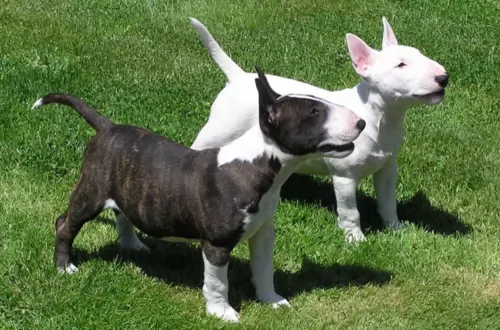 With his short, smooth coat, the Miniature Bull Terriers requires little grooming. He’ll need a good brush down twice a week to remove loose hairs.
With his short, smooth coat, the Miniature Bull Terriers requires little grooming. He’ll need a good brush down twice a week to remove loose hairs.
This is one of the best things you can do for your Bull Terrier if you don’t want them having puppies. Spaying or neutering decreases the likelihood of certain types of cancers too.
Keep your dog’s diet consistent, varying between a top quality commercial produced dog food appropriate to his age. You can include home-made meat, vegetables and rice and some raw meat every now and then. Never feed him human-food such as peanuts, crisps and chocolate. Always have fresh, cool water available night and day.
 Feed your Sakhalin Husky a commercially manufactured dog formula that caters to his energy and digestive needs.
Feed your Sakhalin Husky a commercially manufactured dog formula that caters to his energy and digestive needs.
Choose high-quality dog food with natural ingredients. Try and include some home-made food into your dogs diet. Boiled chicken, brown rice or pasta, sweet potatoes, carrots and spinach will do him wonders and you can chop it up and add some into the dry kibble as a treat twice a week.
Some raw meat occasionally is also important to prevent skin problems. Be sure that cool, fresh water is available for your pet at all times.
This will require regular exercise. Walks are always good, but he will require something more hectic such as long hikes and frisbee or ball throwing games.
A Husky’s dense double-coat must be brushed at least twice a week as he is a fairly heavy shedder.
His nails grow quickly and these will need to be trimmed. Even though he has erect ears, you will need to check inside for cleanliness to avoid canine ear infections.
Check inside his mouth as well for bad teeth as these can have a detrimental affect on his health